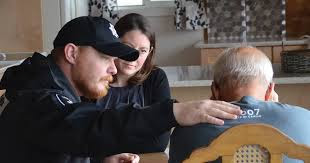As we saw in our previous blog
Don Ritchie saved lives. He didn’t seek or need recognition. He didn’t bother
to keep a record of it. Some of those he helped did not even say thank you. Don’t
forget, ten lepers were healed by Jesus, but only one bothered to return with gratitude.
But, make no mistake, Jesus will remember and even reward our every effort made
in his name.
In our busy world, we want to schedule everything around our
calendars. To be sure, organizing and finding balance in our lives is important.
However, I’ve noticed that the most meaningful encounters are in unscheduled
moments. Our scheduled busy lives can get in the way of being present in
people’s lives. We get distracted far too easily.
Weapons of mass distraction
We surround ourselves with diversions – busy entertaining distractions are
everywhere. Os Guinness said, “We modern people are not only surrounded by
diversions we are mesmerized by them, and we rarely let our minds to think
beyond them.”
With all the noise in this world who can hear anything,
especially someone crying out for help. Far too many tell themselves, ‘I will engage
with that person ‘later’ when it’s convenient or when I have more time, I will
reach out to them.’ Sound familiar?
The ministry of presence trusts and celebrates God’s work
in people
God knows a person’s whole story, and he doesn’t give up on anyone. We, on the
other hand, can give up on people. It is a natural aspect of our fallen nature
to judge and condemn instead of loving and helping other people.
In spite of all the havoc, Saul of Tarsus wrecked on the
early church. Barnabas went to Troas to look for Saul and when he found him,
he brought him to Antioch (Acts 11:25-26) Saul was public enemy number one
for the early church. Yet Barnabas trusted in God’s work in Saul’s life and he
even took the initiative to “look for” Saul in his hometown.
Whom are you looking for? Who are the people who society,
even the church, may have given up on or forgotten? Yes, our support of someone
may involve accountability, but it should also be marked by compassion. I thank
God for the friends who believed in God’s work in my early walk with Christ.
Your presence doesn’t require an official prerequisite
After Don Ritchie’s fifty years of practicing being present for others at
the Gap, most if not all of Don’s award recognitions occurred in his eighties.
“My ambition has always been to just get them away from the edge, to buy them time,
to give them the opportunity to reflect and give them the chance to realize
that things might look better the next morning.” Don Ritchie
Don sought opportunities to show up at the right moment. Don shows us that
anyone can make a difference! Unfortunately, too many people ignore loved ones or
family members who are clearly in mental anguish. They do not know what to say,
so they say and do nothing. This is a huge mistake.
You may not be an expert, but your care and compassion are essential.
Your presence is needed. Over time many believers have discovered that they cannot
just quote a bible verse to someone who is in trouble, they also need to be
present in their lives at that moment. The Bible is powerful to be sure, but it
is most powerful and effective when it is experienced in the context of
relationships.
According to psychologist Larry Crabb, when someone is
experiencing mental and emotional trauma, non-experts are just as important as
experts in the healing equation. Crabb’s research over the years compared the
effectiveness of professional therapists to lay counselors and found that lay
counselors are generally as effective as professional therapists for the most
common problems.
The importance of his point is not that therapists are
ineffective or are unimportant, but rather, everyday people need to know
that they can help when friends and family face problems. As a pastor, I’ve
met hundreds of parents and friends who regret that they did nothing when a
loved one was paralyzed in the quicksand of a crisis.
We can learn from the example of Don Ritchie. You don’t need
prepared remarks, but a compassionate listening heart. Don Ritchie asked a
simple question with a smile, “Can I help you in some way?”
You can say that too! Now, go ahead…



